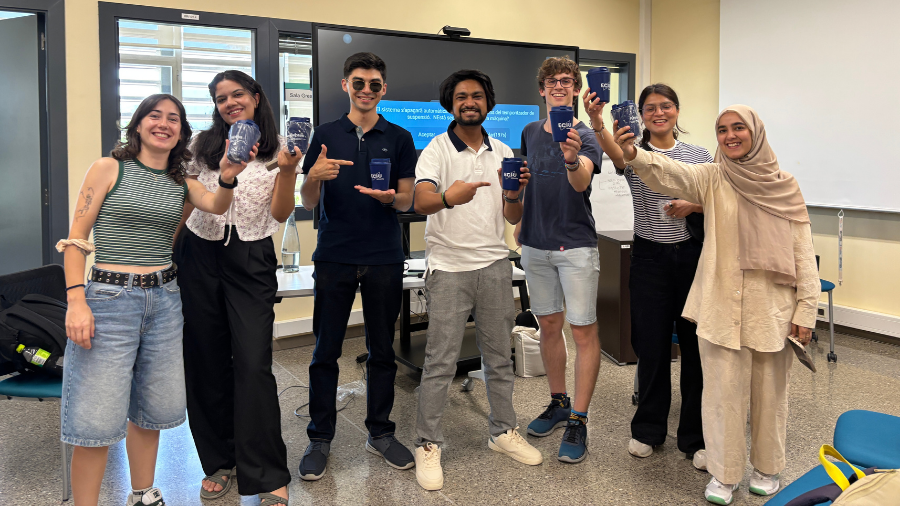Students from 10 European universities work on real challenges at the UAB
From 30 June to 4 July, the UAB hosted a mobility experience of the ECIU, the UAB's European alliance, an initiative cofunded by the European Union that advocates for transformative education based on real challenges. The activity brought together students from 10 European universities: University of Trento, Italy; Lodz University of Technology, Poland; Kaunas University of Technology, Lithuania; Hamburg University of Technology, Germany; Groupe INSA, France; Tampere University, Finland; Dublin City University, Ireland; University of Stavanger, Norway; Linköping University, Sweden; and the UAB. The ten students participated in three different programmes that shared one same objective: generating social impact through innovation and collaborative work.

One of the challenges that stood out was the Empowering Neighbourhoods Challenge, in which 15 students explored ways to empower neighbourhoods in northern Barcelona through community projects. Using methodologies such as ethnographic observation, interviews and local immersion, participants worked closely with an array of social realities, and visited places like the Canòdrom centre, the Trinitat Vella library and the Nau Bostik artistic centre. They also collaborated with social entities such as La Veïnal and the Federation of Neighbourhood Associations of Barcelona (FAVB), and were invited to participate in the Migrantour, an anti-racist itinerary focusing on the dynamics of urban exclusion. The challenge ended with practical proposals for community life in peripheral neighbourhoods.
The Creating an Inclusive Environment for Children with Multiple Disabilities challenge brought together 9 students to work on one common objective: making everyday environments more inclusive for students with multiple needs. In collaboration with the Nexe Fundació, a leading entity in the support of children with multiple disabilities, participants worked on innovative proposals at the Design Lab of the UAB.
Two important proposals resulted from this challenge:
- Facial Expression AAC: an augmentative and alternative communication system based on facial recognition (OpenFace) and affordable technology such as Raspberry Pi and a camera, which allows children with cerebral palsy to communicate through smiles and eye blinking. The system transforms these expressions into predefined spoken phrases via Alexa and can be integrated into home automation devices. The proposal is open-code, can be personalised, and contains a high emotional value, designed for cases such as Emma's, a ficticious 8-year-old girl. The benefits are tangible, such as clear communication, improved autonomy, accessible and affordable system, time and cost efficient; and also intangible, such as dignity and inclusion, confidence and self-esteem, and new opportunities. This solution was proposed by Abhishek Kumar, Prashant Gode and Harsh Lokhande from the Hamburg University of Technology.
- MayAIGo: an inclusive reviews and visual guides app that makes life easier for people with multiple discapacities and their carers. The proposal includes functionalities such as reviews of accessible places, storyboards on which to prepare visits, which can help to reduce anxiety and improve the experience, information on sensorial environments and communicative accessibility. In addition, the app fosters the creation of a community of users for the disabled and their carers and promotes local events that take into account accessibility. The app will incorporate improvements such as pictograms, virtual reality and chats among families. This proposal was developed by Claire Hefferon (Dublin City University), Abdullah Fahim (Tampere University), Bakhtawar Mir (Tampere University), Guillem Martinez (UAB), Nathalie Saab (Kaunas University of Technology), and Mahammad Ismayilov (Kaunas University of Technology).
The micro-module Fortress Europe: Human Rights Violations at Europe's Borders, organised with the Fundació Autònoma Solidària of the UAB and the collaboration of the Catalan Agency for Development Cooperation, included the participation of 22 students and focused on the denunciation and critical analysis of the violation of human rights suffered by migrants, refugees and displaced persons. Using a theoretical and practical approach, participants attended seminars with experts such as Lorenzo Gabrielli, from the GEA and GRITIM research groups, who spoke about the externalisation of borders; José Bautista, from the Fundación PorCausa, who offered a session on militarisation; and organisations such as Irídia, Novact and Collective Aid, who work in areas such as the south of Spain and the Balkans. The meetings with members of organisations such as Top Manta, MigrEss, La Tregua and an intercultural dinner/workshop offered by ABARKA were ways to give these migratory experiences a face, and the final proposals by students were centred on awareness-raising and the promotion and detection of the rights of migrants, refugees and displaced persons.
This mobility experience demonstrates the potential of the ECIU alliance's educational model, which advocates challenge-based learning, interdisciplinary collaboration and active involvement with surrounding communities. In addition to generating knowledge, the proposals presented by students offer viable solutions with a strong commitment to social justice, accessibility and human rights.
The UAB, with Sustainable Development Goals
Reduced inequalities
Quality education